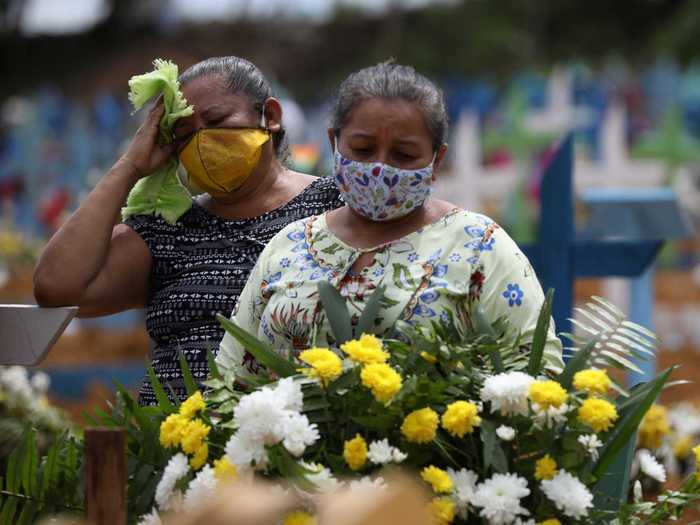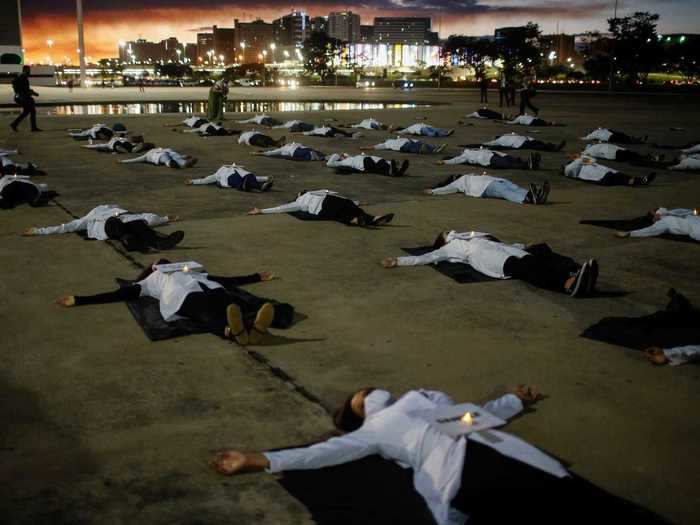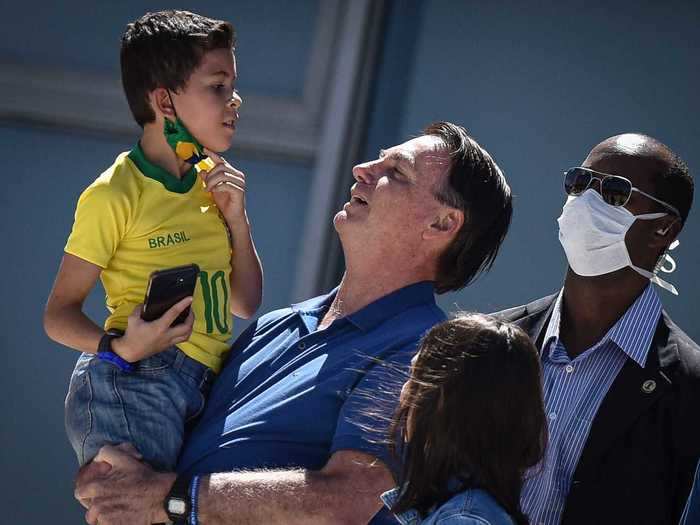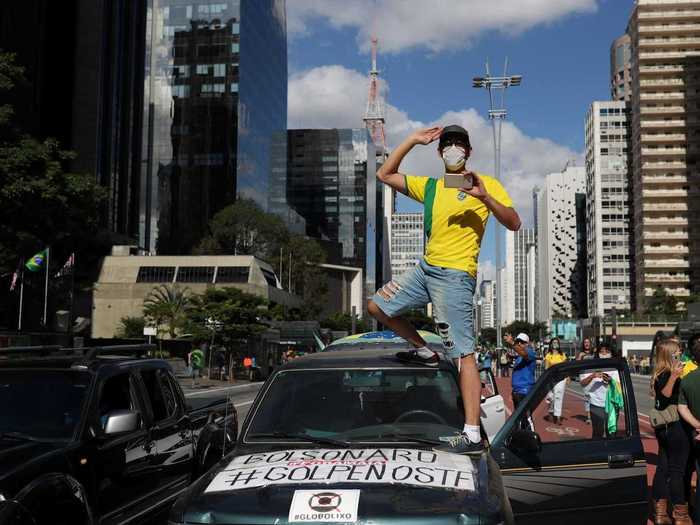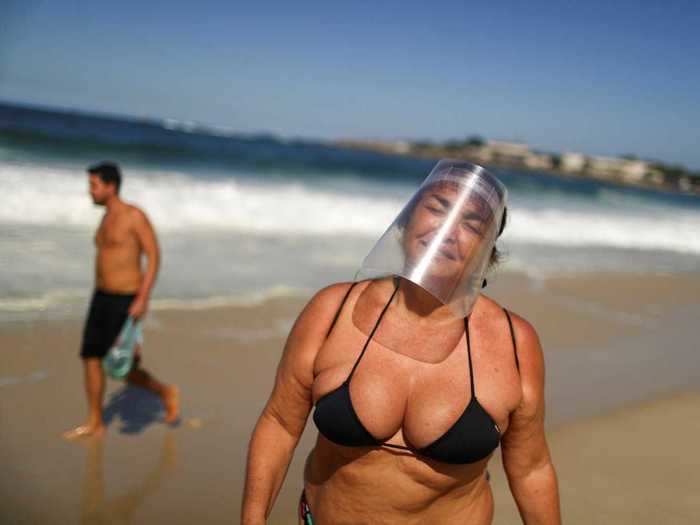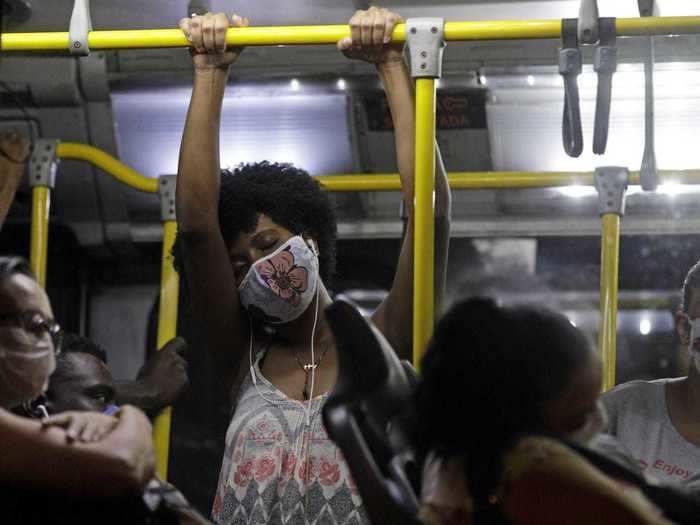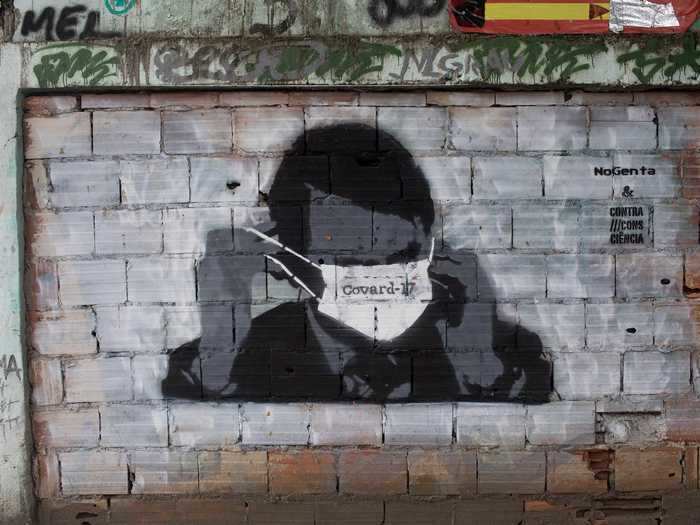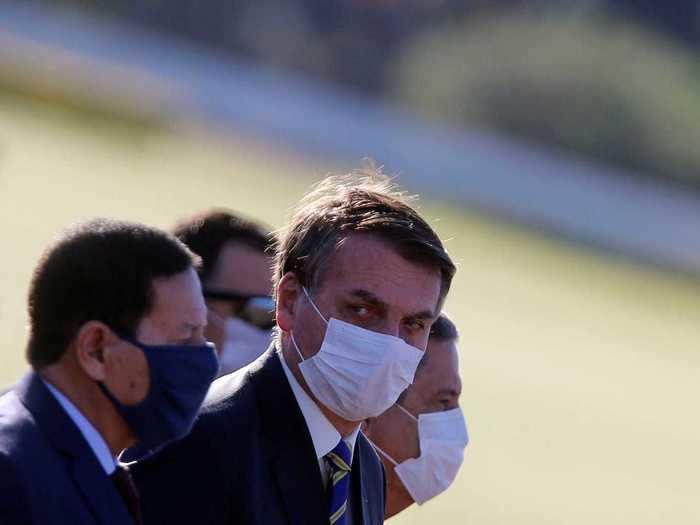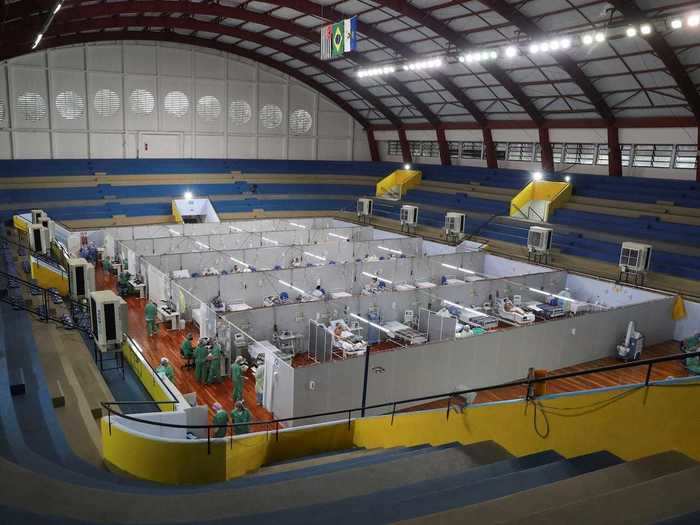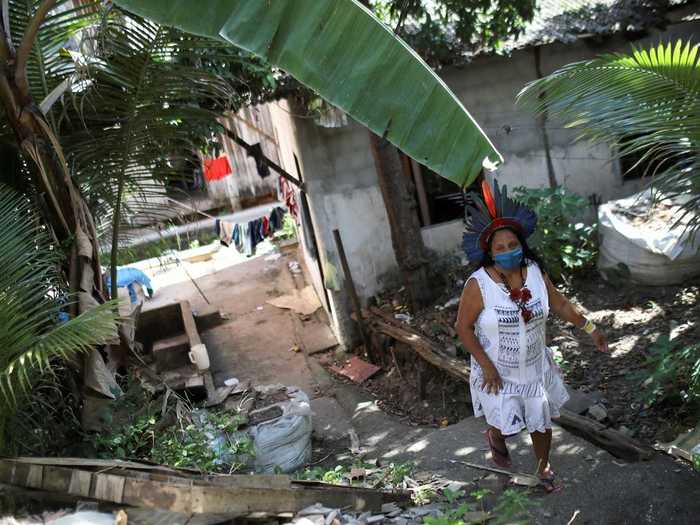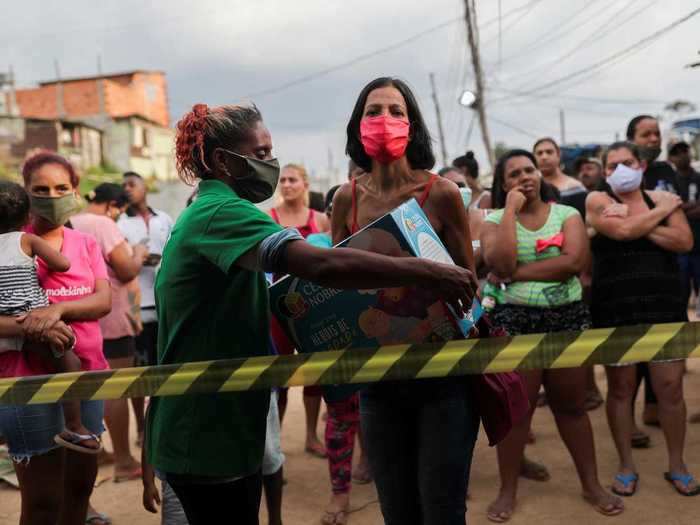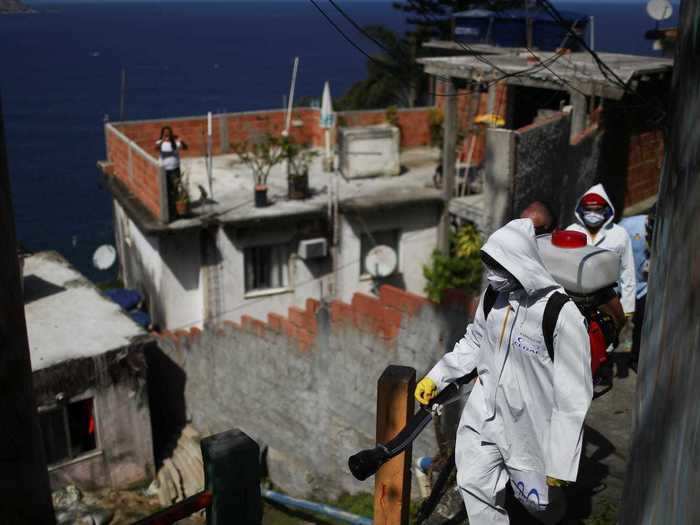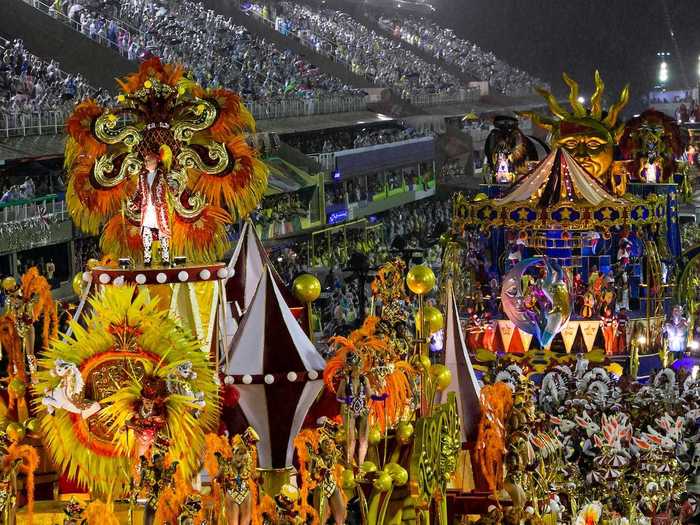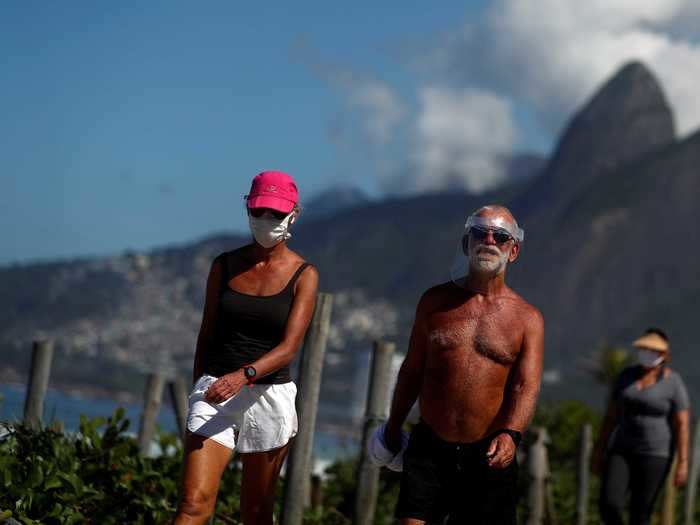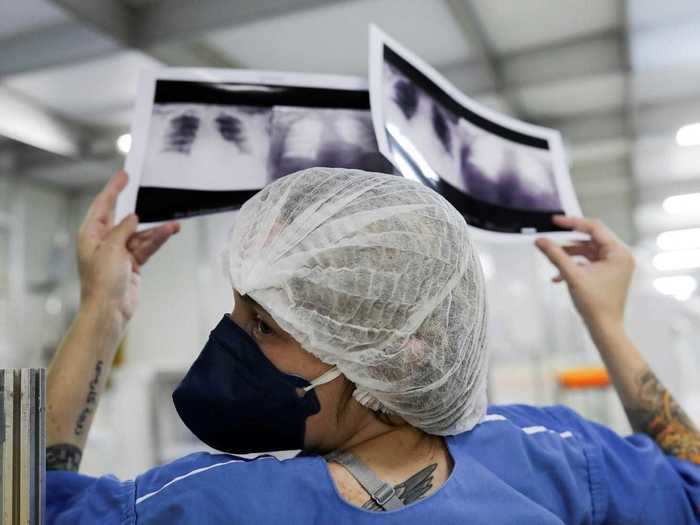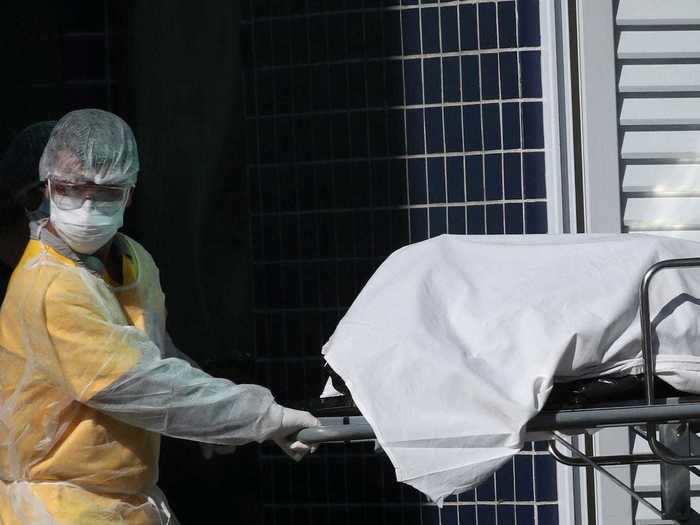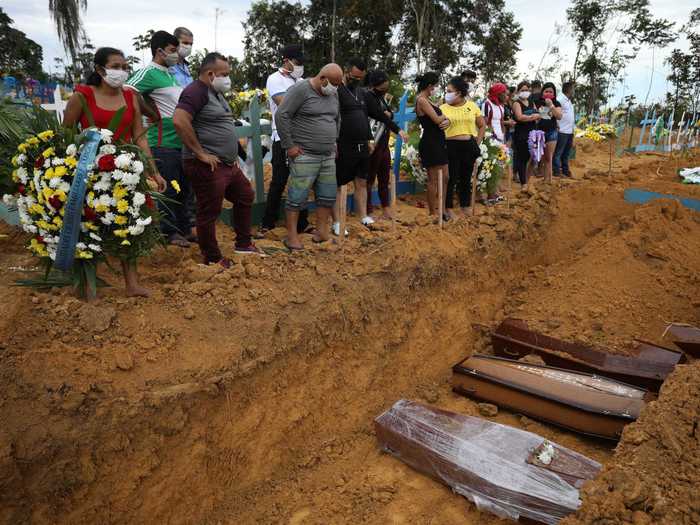Passengers wearing protective face masks travel on a public bus in Rio de Janeiro, Brazil, on April 29, 2020.Ricardo Moraes/Reuters
- With more than 13,000 deaths and over 190,000 confirmed cases, Brazil is emerging as the world's new coronavirus hotspot.
- While the first infections were spotted in the richer neighborhoods of large cities, the virus has since been spreading rampantly in the country's favelas.
- But as hospitals and morgues in the country are becoming overwhelmed, its president, Jair Bolsonaro, continues to downplay the threat of the virus, dismissing it as a "little flu."
- While anti-lockdown protests have emerged, others have been very critical of the Brazilian president's handling of the coronavirus pandemic, staging protests and voicing outrage on social media.
- Despite the growing coronavirus cases, Brazil is currently not under a nation-wide lockdown. But some individual state governors have gone against Bolsonaro's orders and imposed their own measures.
- Scroll down to see photos of what it's like in the country, which is expected to become one of the worst-hit coronavirus places in the world.
- Visit Business Insider's homepage for more stories.
With the sixth-worst death toll in the world, Brazil has emerged as the new coronavirus hotspot.
Brazil's hospitals, morgues, and cemeteries has been grappling with a rising number of coronavirus cases, which were first brought into the country by people traveling back from Europe and the US in February.
But despite growing concern that the country will record thousands of more deaths from the virus, its president — Jair Bolosnaro — never imposed a nation-wide lockdown.
Bolsonaro continues to downplay the threat of the virus, attending anti-lockdown protests and starting feuds with state governors, who have gone against his orders by individually issuing partial lockdowns.
Photos show what it's like in Brazil as its rapidly becoming one of the worst-hit countries from the coronavirus in the world.
Read the original article on
Business Insider
With more than 13,000 COVID-19 deaths at the time of writing, Brazil is now the sixth worst-affected country in the world in terms of recorded deaths.
Women react during a collective burial of people that have passed away due to the coronavirus disease at the Parque Taruma cemetery in Manaus on April 28, 2020.
Bruno Kelly/Reuters
But Bolsonaro has also been heavily criticized. Nurses and doctors have staged several protests against the deaths of their colleagues and state governors have ignored his orders.
Nurses lie on the ground with signs bearing the names of healthcare professionals who died from the coronavirus during a protest in Brasilia on May 12, 2020.
Adriano Machado/Reuters
Bolsonaro's popularity has suffered since the crisis began, with his disapproval rating rising to more than 55% from 47% in January, according to a new survey released in the Guardian.
This week the Brazilian president said that beauty salons, gyms, and barbers can "re-open" as they should be treated as "essential services" — a decree that was ignored by several state governors, who worry that the situation is only getting worse.
Rio de Janeiro governor, Wilson Witzel tweeted on Tuesday, May 12: "Bolsonaro is walking toward the precipice and wants to take all of us with him."
Davi Alcolumbre, the head of Brazil's Senate, previously said the country needs "serious, responsible leadership" in times like this, according to the BBC.
Both sides have threatened to take their fight to court.
Source: The Guardian
On different occasions, they have been joined by Bolsonaro, who told the protestors they were "patriots" for defending their individual freedoms.
Brazil's President Jair Bolsonaro attends his supporters during a protest in favor of the government and and against the lockdown in front of the Planalto Palace in Brasilia, Brazil, on May 3, 2020.
Andre Borges/NurPhoto via Getty Images
Some people have opposed the lockdowns, taking to the streets of Brasilia to demand that restrictions on movement introduced to stop the spread of coronavirus be lifted.
Supporters of far-right Brazilian President Jair Bolsonaro take part in a motorcade to protest against social distancing and quarantine measures in Sao Paulo on May 3, 2020.
Amanda Perobelli/Reuters
Some protesters attending the rally also held up signs calling for the shut-down of Brazil's Congress and the Supreme Court, while others said they wanted the military to take over the handling of the pandemic, according to the BBC.
Source: BBC
However, most governors and mayors have not yet imposed mandatory stay-at-home orders.
A woman wearing a protective face shield walks along the Copacabana beach in Rio de Janeiro on April 29, 2020.
Pilar Olivares/Reuters
Bolosonaro never imposed a nation-wide lockdown, but city mayors and state governors have individually taken steps to close schools, universities, and businesses and restrict movement.
Passengers wearing protective face masks travel on a public bus in Rio de Janeiro, Brazil, on April 29, 2020.
Ricardo Moraes/Reuters
Public officials have been under increasing pressure to further clamp down with lockdown measures, as the situation seems to be getting worse in the country.
Miguel Lago, executive director of Brazil's non-profit Institute for Health Policy Studies, told the Associated Press that mandatory lockdowns across much of the country would help.
"We need to avoid a total disaster. It is late in terms of avoiding hospital collapse, but certainly, it isn't too late to avoid a bigger catastrophe," Lago said.
Source: Associated Press
In March, the president caused outrage on social media after he responded to reporters asking about the rising death toll by saying: "So what? I'm sorry. What do you want me to do?"
A graffiti of Brazil's President Jair Bolsonaro wearing a protective mask in Rio de Janeiro, Brazil, Tuesday, April 7, 2020.
Associated Press
Bolsonaro also suggested his people are naturally immune to the coronavirus, claiming they can swim in sewage and "nothing happens."
"I don't think it will reach that point. Especially because Brazilians have to be studied," Bolsonaro said, according to TV Globo. "They don't get anything. You see the guy jumping into the sewer there, going out, diving, right? And nothing happens to him."
Source: Business Insider
Meanwhile, President Jair Bolsonaro has consistently downplayed the threat of the virus, calling it a "little flu", and publicly dismissing quarantine and social distancing measures.
Brazil's President Jair Bolsonaro wearing a protective mask at a national flag hoisting ceremony in front of the Alvorada Palace in Brasilia on May 12, 2020.
Adriano Machado/Reuters
Hospitals, morgues, and cemeteries across the country have been overwhelmed with the rising number of COVID-19 cases.
Patients suffering from the coronavirus disease are treated at a field hospital set up at a sports gym, in Santo Andre, Sao Paulo on May 6, 2020.
Amanda Perobelli/Reuters
In early April, Brazilian health officials confirmed that COVID-19 had even reached a remote Yanomami tribe in the Amazon.
An Indigenous woman walks at the Satere Mawe Association of Indigenous Women in Manaus on April 24, 2020.
Bruno Kelly/Reuters
With cramped homes, large households, and few public parks, social isolation is very difficult in many of the country's favelas.
A woman receives a box with food donations organized by NGO Kapadocia Institute for poor families from Capadocia Slum at Brasilandia district in Sao Paulo on May 1, 2020.
Amanda Perobelli/Reuters
Another problem in the favelas seems to be a lack of awareness.
Rene Silva, the director of the Voz das Comunidades newspaper which produced for and by people in Rio de Janeiro's favelas, told The Independent: "[People in the favelas] don't think that coronavirus is something serious."
"They think this is a disease for rich people, that is something from abroad that won't affect them," Silva added.
Source: The Independent
Many of the early infections were seen in rich neighborhoods of large cities, including Copacabana in Rio de Janeiro. But it only took a few weeks before the virus made its way to Brazil's poorest areas — the favelas.
Clean workers disinfect Vidigal slum in Rio de Janeiro, Brazil, on April 24, 2020.
Pilar Olivares/Reuters
Wallace Pereira, a community leader in Rocinha — the largest favela in Brazil — told the Guardian: "We're facing a public disaster here. People are getting sick and they have nowhere to go."
"The situation is getting worse because many people are going around saying: 'This virus won't get me' – which is a fantasy," Pereira added.
Source: The Guardian
But while the country saw a spike in infections, it still went ahead with its annual arnival celebration. At this point, the coronavirus had already spread to 20 countries.
The Academicos do Salgueiro Samba School performance during the 2020 Rio de Janeiro Carnival champions' parade at the Sapucai Sambadrome on February 29, 2020.
Bruna Prado/Getty Images
The virus appears to have been brought into the country by people who traveled to Europe and the US during public holidays in February.
People walk in Rio de Janeiro on March 24, 2020.
Reuters
Brazil officially recorded its first coronavirus-related death on March 16, but experts believe that someone died from the virus as early as January 15.
Doctor Luciana Souza compares two different chest x-rays of a patient as she talks to a colleague at a field hospital in Guarulhos, Sao Paulo state on May 12, 2020.
Amanda Perobelli/Reuters
Scientists at the Oswaldo Cruz Foundation in Rio de Janeiro said that based on molecular tests of patients taken to hospital with respiratory problems, one man who died mid-January had COVID-19, the BBC reported.
The South American country recorded its deadliest day from the virus on May 12 and now has more than 190,000 cases — a number which is likely to be a lot higher.
A healthcare worker transports the body of a person to a refrigerated truck at the Evandro Freire hospital in Rio de Janeiro on April 28, 2020.
Ricardo Moraes/Reuters
Experts say that the actual number of cases is probably 15 times higher than what has been reported due to the lack of testing in the country, according to the BBC.
Domingo Alves from the University of Säo Paulo Medical School told the broadcaster: "Brazil is only testing people who end up in the hospital. It's hard to know what's really happening based on the available data."
"We don't have a real policy to manage the outbreak," he added.
Source: Wordometer, BBC
While some countries are starting to lift lockdown measures after seeing a drop in coronavirus cases, Brazil is quickly emerging as the world’s new hotspot.
A mass burial of people that have passed away due to the coronavirus disease at the Parque Taruma cemetery in Manaus, Brazil, on April 23, 2020.
Bruno Kelly/Reuters
The World Health Organization (WHO) said last week that the Americas are currently at the center of the pandemic, according to the BBC.
Source: BBC

